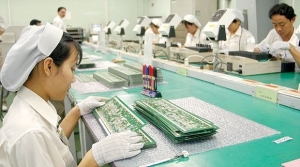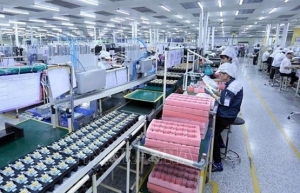Innovating to ease burdens of crisis
 |
| Ramla Khalidi - Resident representative designate United Nations Development Programme in Vietnam |
Vietnam aspires to become an upper middle-income country with a modern industrial base by 2030, and a high-income developed country by 2045. Science and technology are central to this vision as catalysts for a prosperous, knowledge-based economy. Since the doi moi reforms were implemented, Vietnam achieved rapid and sustained economic growth, at an average of 7 per cent.
More impressive than the growth rate, Vietnam has seen a reduction in extreme poverty and low levels of economic inequality. Vietnam’s broad-based development has avoided the explosive rise in inequality, seen in other countries, propelling steady progress toward achieving the Sustainable Development Goals.
We live in an age of profound economic, political, and ecological disruption. Humanity has caused significant global warming and other changes to land, environment, water, organisms, and the atmosphere. We face unprecedented challenges such as the pandemic, the climate crisis, biodiversity loss, and extreme pressure on fragile agricultural systems. Directed science and technology can help us solve some of these problems.
Advances in renewable energy technologies have driven down costs and will help break our dependence on fossil fuels and drive the just energy transition. We are learning how to incorporate the principle of circularity into production and consumption. And agricultural tech help us produce food more cheaply and with less impact on the natural environment.
Achieving greater consistency in policies and regulations across government agencies, and between central and local levels, is a priority. Many government agencies are involved in developing and implementing science and technology policies. However, regulations are sometimes overlapping, inconsistent or even contradictory.
Policy experiments can help identify gaps and inconsistences in existing policies and market requirements. The United Nations Development Programme (UNDP) has implemented experiments in Danang with the circular economy roadmap, and in the central city of Hue on improving access for citizens to e-governance and green transportation. Similar approaches should be used to solve specific challenges in sci-tech market development, and the results applied more widely.
Investment in research and development is a key driver of sustainable development. Ensuring financial investments whether public or private are strategic and coherent helps avoid inefficiencies and fragmentation.
However, innovation should not be confined to high-tech parks, large firms, and international corporations. Cooperation between scientists and grassroots innovators is equally important to promote needs-based instead of paper-based research.
Grassroots innovators helped ease the burden of the lockdowns, by creating rice ATMs, applying robotic technology, and creating apps to connect those providing services with those who need them. Take the case of Minh Hong Biotech, a firm supported by the UNDP that adopts the circular economy business model by converting organic waste into household cleaning products. The project developed into a business with a mission to reduce environmental pollution and provide job security for poor households. Today, the group processes about 109 tonnes of waste to produce 50,000 litres of cleaning products a month, and has created decent jobs for over 400 women.
The government’s policy on developing national and regional innovation and startup centres emphasises the importance of science education and closer relationships between public and private research institutions and enterprises.
Such an open innovation system requires an enabling innovation culture where taking risks and accepting failure is encouraged, particularly in the public sector. I heard that in Vietnam there is a saying: failure is the mother of success; meaning: embracing failure, and learning from it, is often a prerequisite to success. This spirit should be institutionalised and incentivised at all levels.
There is a common perception that innovation and adoption of new practices in the public sector lag behind the private sector, due to a lack of incentives and mechanisms that support policy experimentation.
To innovate means to break new ground, experiment, and solve old problems in new ways. These are risky by nature, and the public sector needs to create a supportive environment to encourage innovative behaviours for public servants and enterprises alike. In this regard, the UNDP has been working with early adopters such as the National Innovation Centre and the National Agency for Technology Entrepreneurship and Commercialisation, to advise their strategy and build capacity for public sector innovation.
 | Vietnam's IT and electronics sector reaching $70 billion in export turnover Vietnam raked in approximately $77 billion from the export of phones, computers, electronic products, and spare parts during the past eight months of the year, according to the information published by the Ministry of Industry and Trade. |
 | Vietnam has “golden chance” to welcome new FDI wave Vietnam has a “golden chance” to attract a new wave of foreign investment, especially to economic zones (EZs) and industrial parks (IPs), according to Deputy Minister of Planning and Investment Tran Quoc Phuong. |
What the stars mean:
★ Poor ★ ★ Promising ★★★ Good ★★★★ Very good ★★★★★ Exceptional
Themes: Digital Transformation
- Dassault Systèmes and Nvidia to build platform powering virtual twins
- Sci-tech sector sees January revenue growth of 23 per cent
- Advanced semiconductor testing and packaging plant to become operational in 2027
- BIM and ISO 19650 seen as key to improving project efficiency
- Viettel starts construction of semiconductor chip production plant
Related Contents
Latest News
More News
- IP alterations shape asset strategies for local investors (January 22, 2026 | 10:00)
- 14th National Party Congress: Vietnam - positive factor for peace, sustainable development (January 22, 2026 | 09:46)
- Japanese legislator confident in CPV's role in advancing Vietnam’s growth (January 22, 2026 | 09:30)
- 14th National Party Congress: France-based scholar singles out institutional reform as key breakthrough (January 21, 2026 | 09:59)
- 14th National Party Congress: Promoting OV's role in driving sustainable development (January 20, 2026 | 09:31)
- 14th National Party Congress affirms Party’s leadership role, Vietnam’s right to self-determined development (January 20, 2026 | 09:27)
- Direction ahead for low-carbon development finance in Vietnam (January 14, 2026 | 09:58)
- Vietnam opens arms wide to talent with high-tech nous (December 23, 2025 | 09:00)
- Why global standards matter in digital world (December 18, 2025 | 15:42)
- Opportunities reshaped by disciplined capital aspects (December 08, 2025 | 10:05)

 Tag:
Tag:

















 Mobile Version
Mobile Version